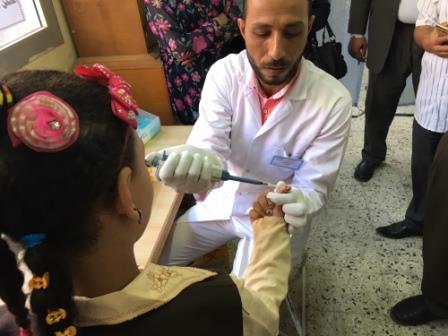 10 October 2017 – The WHO country office Egypt, in collaboration with the Ministry of Health and Population, launched the evaluation of the second national soil transmitted helminthes deworming mass drug administration campaign for school aged children in Egypt. The campaign aims to evaluate the current prevalence of the soil transmitted helminthes before starting the distribution of 12.5 million mebendazole tablets in a mass drug administration for school children at 10 governorates: Beheira, Sharqia, Port Said, Kafr El-Sheikh, Dakahlia, BeniSweif, Assiut, Sohag and Giza.
10 October 2017 – The WHO country office Egypt, in collaboration with the Ministry of Health and Population, launched the evaluation of the second national soil transmitted helminthes deworming mass drug administration campaign for school aged children in Egypt. The campaign aims to evaluate the current prevalence of the soil transmitted helminthes before starting the distribution of 12.5 million mebendazole tablets in a mass drug administration for school children at 10 governorates: Beheira, Sharqia, Port Said, Kafr El-Sheikh, Dakahlia, BeniSweif, Assiut, Sohag and Giza.
A preparatory sensitization meeting for health teams in the selected governorates was conducted before the start of the fieldwork as a first step in the evaluation phase. Secondly, the health teams from the Ministry have visited 6 schools per governorate to take 100 stool samples and provide haemoglobin tests to students at each of the randomly selected schools with the supervision of the Ministry to ensure proper implementation on the ground.
The burden of disease caused by soil-transmitted helminthes and schistosome infections is enormous. More than 2000 million people are affected worldwide, of whom more than 300 million suffer from associated severe morbidity. Moreover, these infections account for more than 40% of the global burden of all tropical diseases, excluding malaria. Use of the school infrastructure to administer deworming drugs is one of the simplest approaches to treating large numbers of school-age children, and school-based programmes have become one of the cornerstones for the control of neglected tropical diseases.




